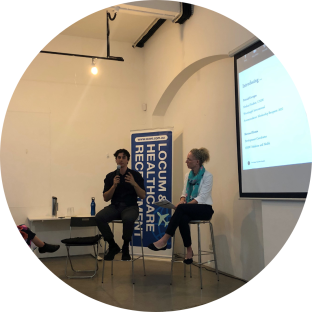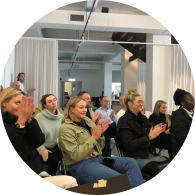Here at Wavelength, we have always recognised the privileged position we find ourselves in, where we can not only support doctors throughout their careers, but can also actively contribute to the improvement of healthcare in Australia through our involvement in charitable events, fundraisers and scholarship programs.
This is no more evident than with the Wavelength University of New South Wales (UNSW) scholarship program. This scholarship has evolved over the years, initially being offered as a once-off $5,000 payment to an Indigenous Australian studying medicine at UNSW to assist with travel costs, or expenses during placement, before being extended to a full accommodation scholarship, offered to one UNSW Indigenous medical student valued at $25,000 per year, for up to six years from 2023.
Recently we were fortunate to meet up with the current recipient of this scholarship, second-year student Patrick Kerrigan.
Patrick is one of over 400 Aboriginal and Torres Strait Islander students currently studying medicine in Australia. This represents an increase from just 265 in 2014, and is in part a reflection of the combined work of secondary school educators, universities and organisations such as the Australian Indigenous Doctors Association (AIDA) to encourage more Indigenous Australians to consider medicine as a career. [1]
While this increase in student numbers is encouraging, there is still an ongoing need to provide support to young Indigenous Australians who choose to pursue a career in medicine.
Combining life experience with the best medical training
For Patrick, his roots lie in Moree in regional NSW, but his experiences living in both remote Indigenous communities in the Northern Territory and in major cities such as Sydney have highlighted to him the differences in access to healthcare in Australia’s regional areas compared to its cities.
This first-hand experience of seeing the challenges of accessing healthcare for remote Australians, and in particular Indigenous Australians, has sparked a desire to pursue a career in medicine that will allow him to return to the parts of Australia where the shortfall in medical practitioners is highest.
“Being Indigenous myself I know there are lots of health differences and there’s the health gap between Indigenous and non-Indigenous people.”Patrick said.
“I recognised I wanted to play a role in reducing that gap by helping Indigenous people.”
Patrick didn’t always think a career in medicine was achievable.
“Through school I looked more into becoming a doctor and doing medicine and I thought I’d never be able to do that but I worked really hard and became more dedicated towards that, and that’s where I am today studying medicine to become a doctor.”
Now that he is nearly two years into his medical studies, Patrick has had a bit of time to reflect on his journey so far. Receiving the financial support offered by the Wavelength scholarship has helped Patrick settle into life in Sydney and devote the time needed to his studies.
“Things like scholarships are just amazing, as are programs that provide extra help to Indigenous kids to study medicine and become a doctor because in the long run, they’ll be very beneficial for Indigenous health,” Patrick said.
Addressing the need for not just more doctors, but more Indigenous doctors
Offering this scholarship is part of the bigger picture for Wavelength. Through our work we can see the gaps in health and medical services around the country, and can see how we can play an important role to close those gaps in rural Australia, particularly within Indigenous communities.
“Giving to UNSW is about supporting cutting-edge research, creating equality of opportunity for students and establishing partnerships that positively impact our community and the wider world.” said Dr John Bethell, Wavelength Director and founder.
As Patrick identified, there’s not only a need for more doctors working in Indigenous health, but a need for more Indigenous doctors as well.
“To have someone from the city that just goes into remote communities and tells them to take this medicine, do some exercise and just learn what’s happening in them – you’re just not going to listen because you don’t understand my story. I feel like that’s a huge issue that needs to be looked at in the future and improved,” said Patrick.
Wavelength Partnerships Manager Carole Paterson stresses how important it is that we understand and address the unique needs of Indigenous Australians. “We’re so lucky living in metropolitan areas with the level of healthcare we have access to, we often forget there are so many who aren’t as fortunate. Events like this [meeting with Patrick] are great reminders that we can make a difference even in small ways”.
 It is hoped that this scholarship will provide not only a life-changing opportunity for Patrick, but for future scholarship recipients too, creating opportunities for Indigenous Australians to undertake studies in medicine and make their own valuable contribution to healthcare in Australia.
It is hoped that this scholarship will provide not only a life-changing opportunity for Patrick, but for future scholarship recipients too, creating opportunities for Indigenous Australians to undertake studies in medicine and make their own valuable contribution to healthcare in Australia.
[1] Liotta, Morgan. Growth in Aboriginal and Torres Strait Islander GP numbers to continue. RACGP 23 February 2021. (https://www1.racgp.org.au/newsgp/professional/aboriginal-and-torres-strait-islander-gp-numbers-g)

